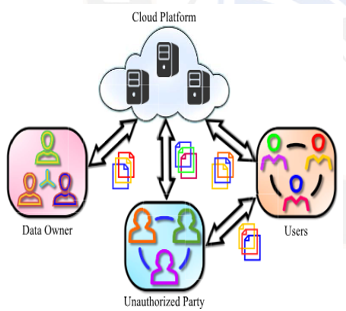Protecting Information Stored Inside the Cloud with A New CCA-EBO Protocol Designed on Hive Technology
Main Article Content
Abstract
Massively scalable facilities may be accessed online with ease due to "Cloud Computing (CC)". The CC resources are primarily characterized by the fact that "Cloud User (CU)" information is often kept on "Cloud Server (CS)" that the CU doesn't even possess or control. The CUs' apprehension about the loss of management of their information may lead to a substantial roadblock in their acceptance of CC offerings. In an attempt to highlight the effectiveness of CC security, the "Cloud Service Providers (CSP)" need to empower the CU to control and evaluate their data. The focus of this research chooses to highlight a key aspect of CC platforms employed to handle CU information on unrecognized CSs at remote locations. Concerns about compromising personal information arise from this feature's importance. In this research, a novel swarm-based "Enhanced BAT Optimization (EBO)" for key generating in "Cloud Computing Accountability (CCA)" for CC information tracking is proposed to solve security issues. Generally, this proposed hybrid CCA-EBO architecture is based on the idea of data accountability, which enables dispersed end-to-end responsibility. The information is made available to the general public, although with a limited set of permissions. The "Cloud Administrator (CA)" would specify the level of access each CU has to the data before it is made available to them. All CU accesses to data are recorded and will be found in a log file for CA to review. According to evaluation methods for the proposed CCA-EBO, existing "Hybrid Secure Cloud Storage (HSCS)", and "Advanced Distribution Verification Protocol (ADVP)", the CCA-EBO provides more security than HSCS, and ADVP in terms of "Auditing Time", "Encryption Time", "Decryption Time", and "Storage Overhead".
Article Details
References
A. K. Singh and I. Gupta, ``Online information leaker identification scheme for secure data sharing,'' Multimedia Tools Appl., vol. 79, no. 41, pp. 31165-31182, Nov. 2020.
E. Zaghloul, K. Zhou, and J. Ren, ``P-MOD: Secure privilege-based multilevel organizational data-sharing in cloud computing,'' IEEE Trans. Big Data, vol. 6, no. 4, pp. 804-815, Dec. 2020.
W. Shen, J. Qin, J. Yu, R. Hao, and J. Hu, ``Enabling identity-based integrity auditing and data sharing with sensitive information hiding for secure cloud storage,'' IEEE Trans. Inf. Forensics Security, vol. 14, no. 2, pp. 331-346, Feb. 2019.
I. Gupta and A. K. Singh, ``An integrated approach for data leaker detection in cloud environment,'' J. Inf. Sci. Eng., vol. 36, no. 5, pp. 993-1005, Sep. 2020.
J. Li, S. Wang, Y. Li, H. Wang, H. Wang, H. Wang, J. Chen, and Z. You, ``An efficient attribute-based encryption scheme with policy update and file update in cloud computing,'' IEEE Trans. Ind. Informat., vol. 15, no. 12, pp. 6500-6509, Dec. 2019.
I. Gupta and A. K. Singh, ``A framework for malicious agent detection in cloud computing environment,'' Int. J. Adv. Sci. Technol., vol. 135, pp. 49-62, Feb. 2020.
L. Zhang, Y. Cui, and Y. Mu, ``Improving security and privacy attribute based data sharing in cloud computing,'' IEEE Syst. J., vol. 14, no. 1, pp. 387-397, Mar. 2020.
I. Gupta and A. K. Singh, ``Dynamic threshold based information leaker identification scheme,'' Inf. Process. Lett., vol. 147, pp. 69-73, Jul. 2019.
I. Gupta and A. K. Singh, ``SELI: Statistical evaluation based leaker identification stochastic scheme for secure data sharing,'' IET Commun., vol. 14, no. 20, pp. 3607-3618, Dec. 2020.
I. Gupta and A. K. Singh, ``A probability based model for data leakage detection using bigraph,'' in Proc. 7th Int. Conf. Commun. Netw. Secur. (ICCNS). New York, NY, USA: Assoc. Comput. Machinery, 2017, pp. 1-5.
G. C. Mara, U. Rathod, S. R. RG, R. Buyya, K. R. Venugopal, S. S. Iyengar, and L. M. Patnaik, ``CRUPA: Collusion resistant user revocable public auditing of shared data in cloud,'' J. Cloud Comput., vol. 9, no. 1, pp. 1-18, Dec. 2020.
F. Wang, L. Xu, K.-K.-R. Choo, Y. Zhang, H. Wang, and J. Li, ``Lightweight certificate-based public/private auditing scheme based on bilinear pairing for cloud storage,'' IEEE Access, vol. 8, pp. 2258-2271, 2020.
R. Ding, Y. Xu, J. Cui, and H. Zhong, ``A public auditing protocol for cloud storage system with intrusion-resilience,'' IEEE Syst. J., vol. 14, no. 1, pp. 633-644, Mar. 2020.
A. S. George and A. S. Nargunam, ``Remote cloud data auditing protocols: A comprehensive analysis and comparative study,'' in Proc. 5th Int. Conf. Intell. Comput. Control Syst. (ICICCS), May 2021, pp. 64-70.
Y. Chen, H. Liu, B.Wang, B. Sonompil, Y. Ping, and Z. Zhang, ``A threshold hybrid encryption method for integrity audit without trusted center,'' J. Cloud Comput., vol. 10, no. 1, p. 3, Dec. 2021.
Joseph, L.M., Thomson Fredrik, E.J. (2022). A Novel Hybrid Approach Based on Filters to Ensure Cloud Storage Data Security. In: Hu, YC., Tiwari, S., Trivedi, M.C., Mishra, K.K. (eds) Ambient Communications and Computer Systems. Lecture Notes in Networks and Systems, vol 356. Springer, Singapore. https://doi.org/10.1007/978-981-16-7952-0_39.
Joseph, L. M., & Fredrik, E. J. T. (2022). Ensuring the security for cloud storage data using a novel ADVP protocol by multiple auditing. International Journal of Health Sciences, 6(S2), 9794–9812. https://doi.org/10.53730/ijhs.v6nS2.7561.

